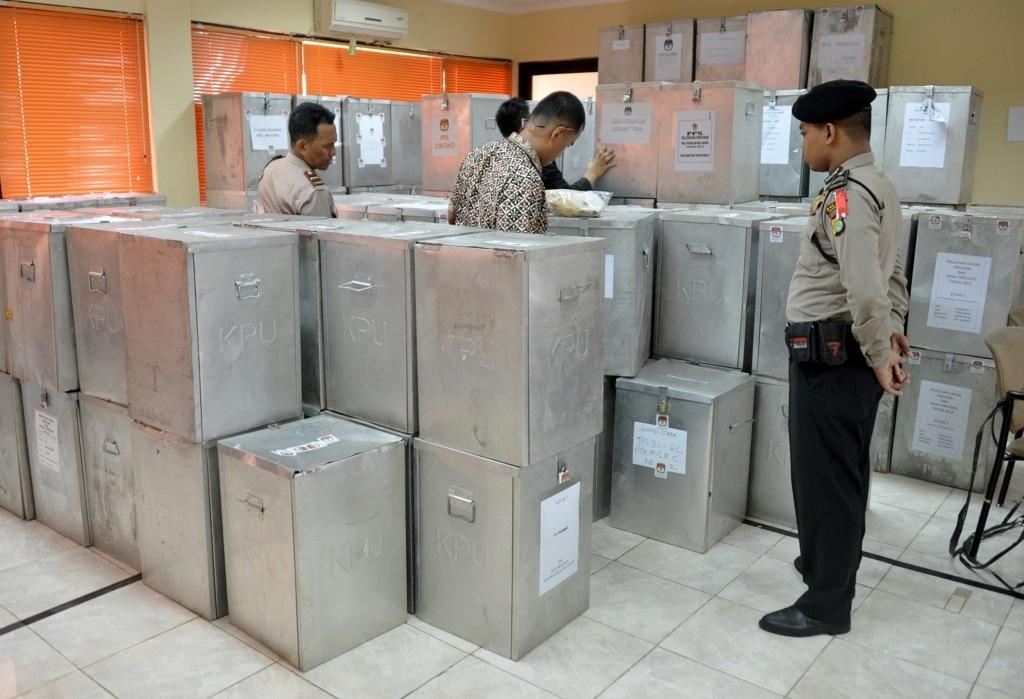To guard against fraud, Indonesians are now crowd-sourcing the vote count for their presidential election
Election officials and police inspect ballot boxes in Jakarta on July 15, 2014, in preparation for national level tabulation.
As Indonesians anxiously await the vote tally from their contentious July 9 presidential election, allegations of fraud and voter manipulation have already begun to surface. But, the citizens of the world’s third largest democracy have found a new tool to keep things honest: a crowdsourcing platform called Kawal Suara.
Roughly translated, Kawal Suara means “guard the voice.” The website allows Indonesians to review and verify a randomly-selected C1 form that shows official tallies for the number of votes cast at a particular polling station. By allowing people to flag irregularities, the hope is that greater transparency will both catch honest mistakes and stop corrupt officials from manipulating the count.
The official tally of the more than 130 million ballots cast is conducted by the General Elections Commission (KPU), which does make some of this information available. Citizens can find the results from close of 500,000 voting booths across the country. But for those who want to monitor the results, the system requires that they download the documents and manually count each vote – a process many observers say is too complex and inefficient to inject any sense of accountability into the electoral process.
This year, transparency will be key to keeping the country calm after a bruising campaign that was notable for a few key reasons. The election pitted Joko Widodo, a young reformer and the populist governor of Jakarta, against Prabowo Subianto, an ex-general whom many see as a representative of Indonesia’s autocratic past. It was the first race to have just two candidates, a development that divided the country across socio-economic lines. It was the first in which pollsters declared different winners after the first quick vote counts. Once the winner is announced, it will also be the first time power is handed from one democratically-elected president to another.
After 10 years in power, outgoing President Susilo Bambang Yudhoyono is stepping down because of term limits. In the lead up to the voting, the race had turned ugly. Joko was accused of being an ethnic Chinese and a Christian — two false claims that undermined his strong lead in the polls — in a country that is predominately Muslim and sometimes dsitrustful of the often wealthy Chinese. Prabowo faced allegations of mass human rights abuses because of his tenure in the army. In recent weeks, as it became clear that the election would be close, independent observers — and even Yudhoyono himself — began warning that political unrest could follow if one of the two candidates didn’t garner enough votes to hold off a challenge to his legitimacy.
Those concerns opened up an opportunity for Reza Lesmana, founder of Kawal Suara. Billing it as a social experiment, Lesmana said he wants to see how accurate the crowdsourced counting could be. His other idea — using optical character recognition to scan the documents — was too time-consuming to develop.
“If KPU opened its data to the public, then the crowdsourcing system like this is not needed,” Lesmana told TechInAsia. “Ideally besides just giving access to data, KPU could also provide [an] online reporting system in case there’s a data entry error. And [it could] also show the follow-up steps that KPU has done.”
Kawal Suara isn’t the only social media tool Indonesians are using to keep track of the vote totals. A handful of other websites are urging people to scan their ballots and tweet about any voting irregularities that they see.
The official vote tally won’t be completed until July 22, giving Indonesians plenty of time to sit in limbo as they wait to see who will be their leader for the next five years. It also gives them plenty of time to make sure government officials get the vote tally right.
